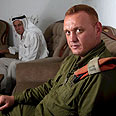Further to my last post, the IDF has come out with a truly amazing statistic. Tamara Shavit reports:
Humanitarian dilemmas are a recurring issue in the Judea and Samaria region. A terrorist fires at IDF soldiers, is shot and gets wounded. Is an IDF medic to be called to treat him? A building is about to collapse in the heart of Ramallah. Does the IDF enter? Does it jeopardize its soldiers’ lives, or does it call the International Red Cross and risk losing precious time?
To Israel, the answer to these questions is clear. According to Division Medical Officer, Lt. Col. Michael Kassirer, “The treatment of the Palestinian population is first and foremost a moral and professional obligation for every one of us.” Do we treat them? There is no question about it. But what happens in the long run and how? Where do international organizations fit in? How will an independent Palestinian medical body be established and how does coordination between bodies happen in life? These are the real questions.
Shavit reports on a Palestinian doctor, Tawfik Nasr, who explained at a conference at the Hadassah hospital in Jerusalem that, although the situation in Judea and Samaria has improved, there are many challenges due to accessibility problems and the ability to move freely from the West Bank into Israel.
But despite these difficulties, there are also many successes.” He cites as an example of patients coming from Gaza, treated in Jerusalem sometimes over a period of three to four months. They receive a special permit from the director allowing them to stay in Israel so they won’t have to go back and forth and are housed in a special hotel in the Mount of Olives. “All these things are ultimately coordinated by the Israeli Civil Administration. Therefore I want to take this opportunity to thank you. It is particularly important for me to express my deep gratitude to Dalia [Basa, the medical co-ordinator for the Territories], who is responsible for organizing everything.”
And here’s the statistic:
Last year, 180,000 Palestinian citizens entered Israel to receive treatment. 3,000 emergency patients were transferred from Israeli to Palestinian ambulances using the “back to back” method, without warning.
So much for genocide.
